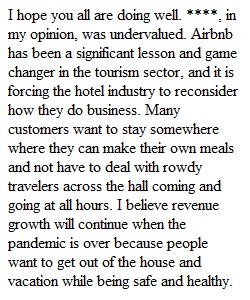


Q Even though the case was written in 2019, which is pretty recent for a case study, a lot more has happened to Airbnb since the case was written. Out of all the companies we have talked about this semester, none were hit by the pandemic as hard as Airbnb. The hotel and travel industry were hit very hard especially as international travel was banned for a large part of 2020. Airbnb was really disrupted by the pandemic and had to make drastic changes including raising billions of dollars in debt, slashing marketing dollars, laying off 25% of their staff, and changing their policies dealing with cancellations. They saw a large rebound as people chose to travel more locally and many felt safer renting out homes over hotel rooms. Normally people rent in big cities, but during the pandemic people fled the big cities to go to rural areas, and were working from home in places that were not their home. Airbnb was supposed to go public at the beginning of 2020 but postponed to December 2020. Airbnb thought it would have a valuation of $30 billion at IPO and instead had a valuation of $47 billion at IPO, the highest U.S. IPO of 2020 (next highest was DoorDash at $39 billion). This lead many analysts to think that it was over valued. Do you think the company was over or under valued and why? Do you think revenue growth will continue as the pandemic ends? How would you describe Airbnb's international strategy? How would you advise Airbnb strategically to ensure future growth in the U.S. and internationally? You will not be able to see other responses until you make one yourself. Please comment on at least one other person's post.
View Related Questions